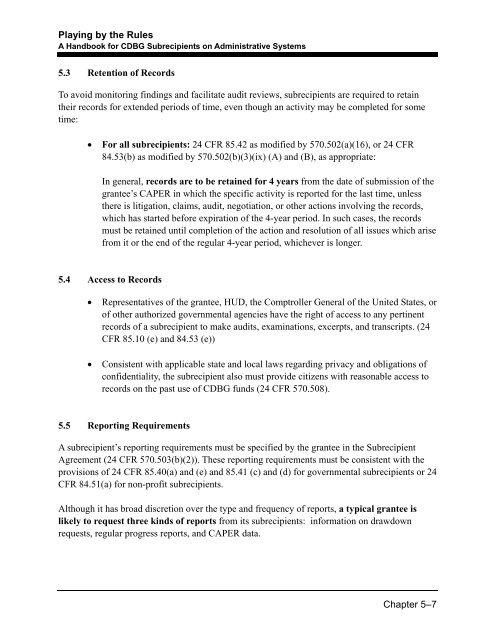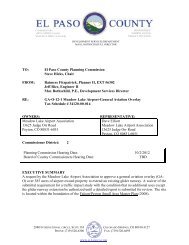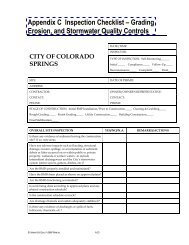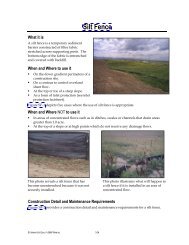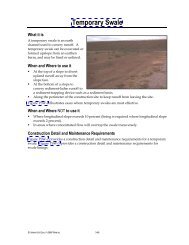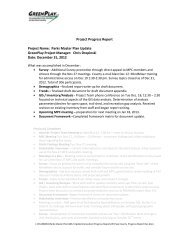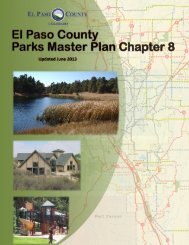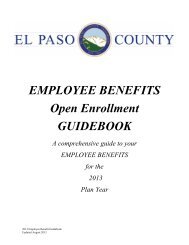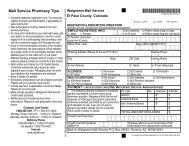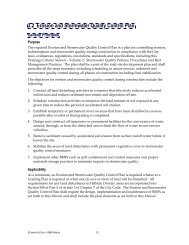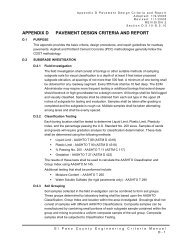Playing by the Rules: A Handbook for CDBG ... - City of El Cajon
Playing by the Rules: A Handbook for CDBG ... - City of El Cajon
Playing by the Rules: A Handbook for CDBG ... - City of El Cajon
You also want an ePaper? Increase the reach of your titles
YUMPU automatically turns print PDFs into web optimized ePapers that Google loves.
<strong>Playing</strong> <strong>by</strong> <strong>the</strong> <strong>Rules</strong><br />
A <strong>Handbook</strong> <strong>for</strong> <strong>CDBG</strong> Subrecipients on Administrative Systems<br />
5.3 Retention <strong>of</strong> Records<br />
To avoid monitoring findings and facilitate audit reviews, subrecipients are required to retain<br />
<strong>the</strong>ir records <strong>for</strong> extended periods <strong>of</strong> time, even though an activity may be completed <strong>for</strong> some<br />
time:<br />
• For all subrecipients: 24 CFR 85.42 as modified <strong>by</strong> 570.502(a)(16), or 24 CFR<br />
84.53(b) as modified <strong>by</strong> 570.502(b)(3)(ix) (A) and (B), as appropriate:<br />
In general, records are to be retained <strong>for</strong> 4 years from <strong>the</strong> date <strong>of</strong> submission <strong>of</strong> <strong>the</strong><br />
grantee’s CAPER in which <strong>the</strong> specific activity is reported <strong>for</strong> <strong>the</strong> last time, unless<br />
<strong>the</strong>re is litigation, claims, audit, negotiation, or o<strong>the</strong>r actions involving <strong>the</strong> records,<br />
which has started be<strong>for</strong>e expiration <strong>of</strong> <strong>the</strong> 4-year period. In such cases, <strong>the</strong> records<br />
must be retained until completion <strong>of</strong> <strong>the</strong> action and resolution <strong>of</strong> all issues which arise<br />
from it or <strong>the</strong> end <strong>of</strong> <strong>the</strong> regular 4-year period, whichever is longer.<br />
5.4 Access to Records<br />
• Representatives <strong>of</strong> <strong>the</strong> grantee, HUD, <strong>the</strong> Comptroller General <strong>of</strong> <strong>the</strong> United States, or<br />
<strong>of</strong> o<strong>the</strong>r authorized governmental agencies have <strong>the</strong> right <strong>of</strong> access to any pertinent<br />
records <strong>of</strong> a subrecipient to make audits, examinations, excerpts, and transcripts. (24<br />
CFR 85.10 (e) and 84.53 (e))<br />
• Consistent with applicable state and local laws regarding privacy and obligations <strong>of</strong><br />
confidentiality, <strong>the</strong> subrecipient also must provide citizens with reasonable access to<br />
records on <strong>the</strong> past use <strong>of</strong> <strong>CDBG</strong> funds (24 CFR 570.508).<br />
5.5 Reporting Requirements<br />
A subrecipient’s reporting requirements must be specified <strong>by</strong> <strong>the</strong> grantee in <strong>the</strong> Subrecipient<br />
Agreement (24 CFR 570.503(b)(2)). These reporting requirements must be consistent with <strong>the</strong><br />
provisions <strong>of</strong> 24 CFR 85.40(a) and (e) and 85.41 (c) and (d) <strong>for</strong> governmental subrecipients or 24<br />
CFR 84.51(a) <strong>for</strong> non-pr<strong>of</strong>it subrecipients.<br />
Although it has broad discretion over <strong>the</strong> type and frequency <strong>of</strong> reports, a typical grantee is<br />
likely to request three kinds <strong>of</strong> reports from its subrecipients: in<strong>for</strong>mation on drawdown<br />
requests, regular progress reports, and CAPER data.<br />
Chapter 5–7


